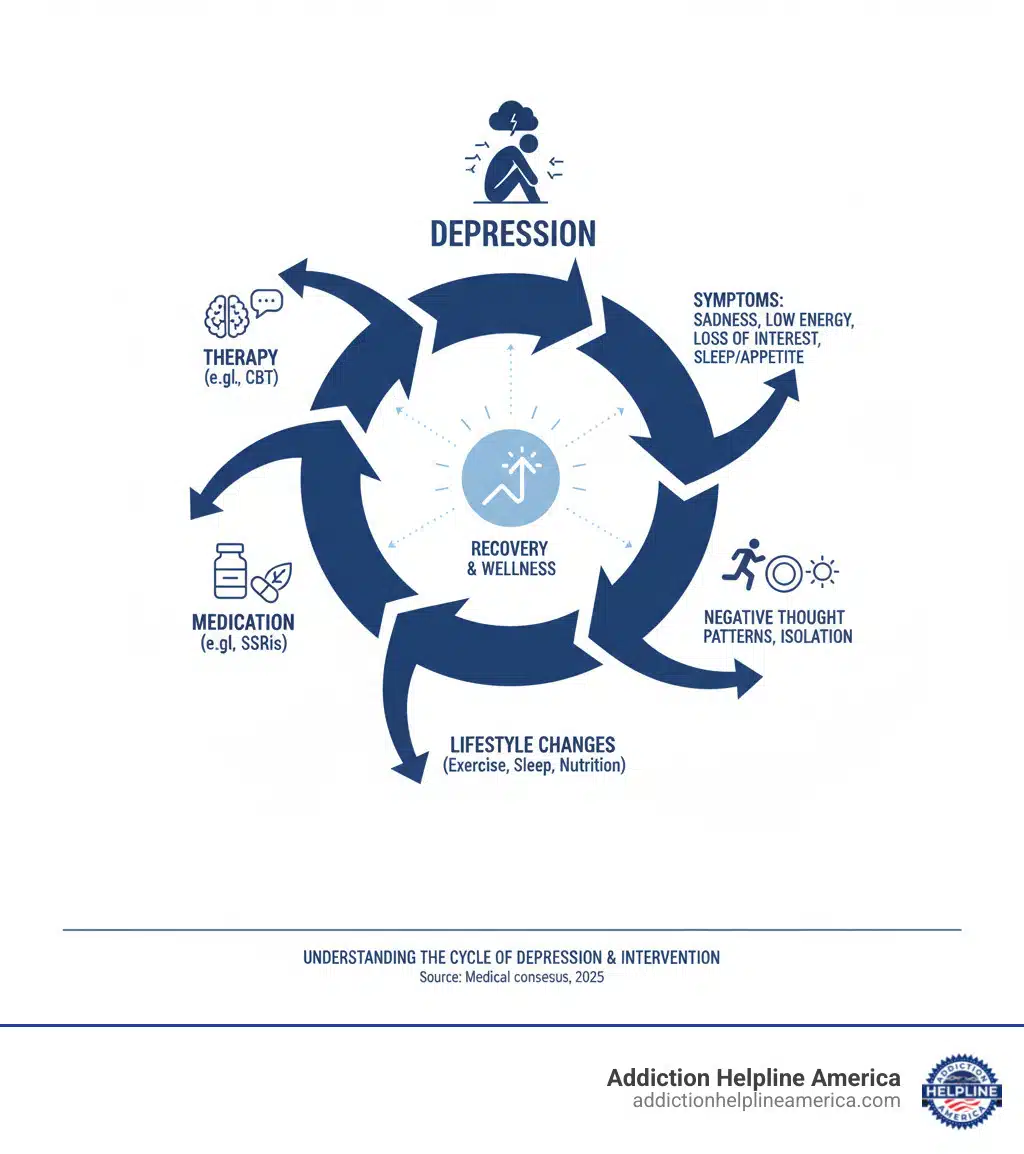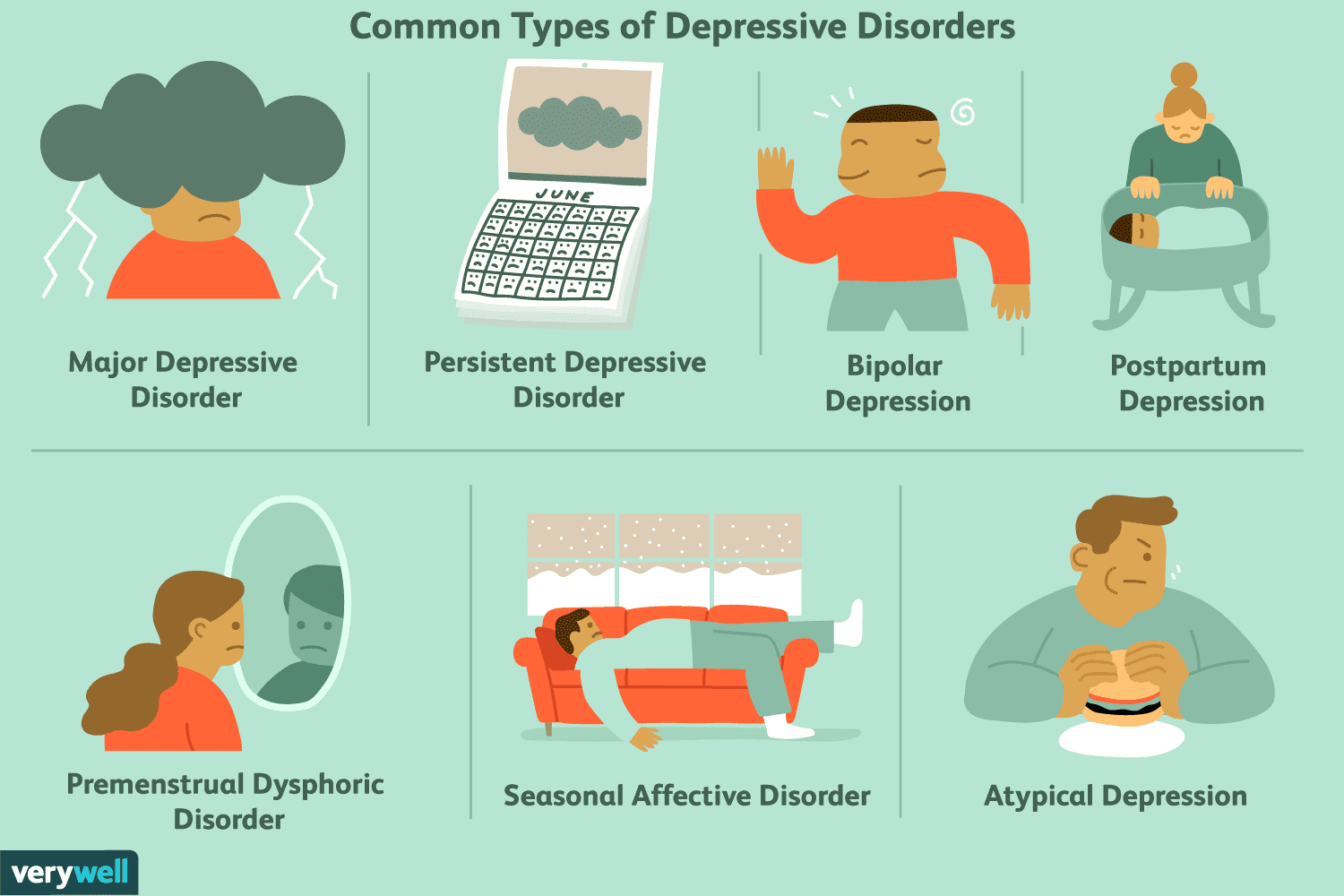Limited Availability: Treatment beds filling quickly. Call now for immediate placement – (844) 561-0606
Depression Treatment encompasses a range of proven approaches—including psychotherapy, medication, lifestyle changes, and advanced procedures—that help millions of people recover from this serious but highly treatable mental health condition.
Quick Overview of Depression Treatment Options:
| Treatment Type | Examples | Best For |
|---|---|---|
| Psychotherapy | CBT, IPT, Behavioral Activation | Most types of depression; first-line treatment |
| Medication | SSRIs, SNRIs, Atypical antidepressants | Moderate to severe depression |
| Lifestyle Changes | Exercise, sleep hygiene, nutrition | All levels; supportive of other treatments |
| Brain Stimulation | ECT, TMS, DBS | Treatment-resistant depression |
| Novel Therapies | Ketamine, Psilocybin (research) | Severe or treatment-resistant cases |
Depression is more than just feeling sad. It’s a common and serious medical condition that affects how you feel, think, and handle daily activities. The symptoms—persistent sadness, loss of interest in once-enjoyable activities, changes in sleep and appetite, difficulty concentrating—can persist for weeks, months, or even years without treatment.
But here’s the hopeful truth: approximately 80% to 90% of people with depression who seek treatment eventually respond well to it. In the United States, while nearly 7% of adults experience depression each year and more than 1 in 6 people will face it at some point in their lifetime, effective help is available.
Depression doesn’t discriminate. It affects adults, teens, and even children (approximately 4.4% of U.S. children have depression). The condition can range from mild episodes that may improve with lifestyle changes to severe, treatment-resistant forms that require specialized interventions. What matters most is taking that first step toward getting help.
The journey to recovery often involves a combination of approaches custom to your specific situation. Some people find relief through therapy alone. Others benefit from medication. Many find that a multi-faceted approach—combining professional treatment with lifestyle modifications—works best.
At Addiction Helpline America, we’ve guided countless individuals and families through the complexities of Depression Treatment, connecting them with appropriate resources and evidence-based care that addresses both mental health and any co-occurring substance use concerns. Our experience has shown us that with the right support and treatment plan, recovery is not just possible—it’s probable.

Depression is a genuine medical condition—not a character flaw, not a sign of weakness, and definitely not something you can simply “snap out of.” Just like diabetes or heart disease, it has real biological causes and requires proper treatment. Understanding what you’re dealing with is the first step toward effective Depression Treatment.
Depression shows up differently in everyone, but certain patterns help doctors make a diagnosis. To qualify as clinical depression, symptoms need to be present for at least two weeks, nearly every day, and represent a noticeable change from how you normally function. At least one symptom must be either persistent sadness or loss of interest in things you once enjoyed.
Your emotions take a hit. You might feel persistently sad, empty, or hopeless—like you’re stuck in a dark tunnel with no end in sight. Some people become irritable or frustrated over small things. Others feel worthless or carry around excessive guilt about things that aren’t their fault. You might cry more often than usual, or feel emotionally numb—unable to feel joy even during moments that should be happy.
Your body feels the impact too. Depression isn’t just “in your head”—it physically exhausts you. Many people describe feeling tired all the time, no matter how much they sleep. Speaking of sleep, depression often disrupts it. You might lie awake at night unable to fall asleep, or you might sleep ten hours and still feel drained. Your appetite can shift dramatically, leading to weight loss or gain. Some people experience unexplained aches, pains, headaches, or stomach problems that don’t respond to typical treatments.
Your thinking becomes foggy. Concentration becomes difficult. Making even simple decisions feels overwhelming. You might forget things more often or struggle to focus on conversations, work tasks, or even your favorite TV show. This mental cloudiness can make daily life feel exhausting.
Your behavior changes in noticeable ways. You might withdraw from friends and family, cancel plans, or stop doing hobbies you once loved—a symptom called anhedonia. Some people become restless and agitated, while others move and speak more slowly than usual. In the most serious cases, thoughts of self-harm or suicide can emerge. This is a critical warning sign that requires immediate help. Data from the CDC shows that the percentage of high school students who experienced suicidal thoughts, plans, or attempts increased from 2011 to 2021. If you or someone you know is having suicidal thoughts, please reach out immediately. The 988 Suicide & Crisis Lifeline is available 24/7 by calling or texting 988.


Take the first step towards a healthier life! Call now to connect with our compassionate team and start your recovery journey today. Your path to healing awaits!
Our recovery specialists are available 24/7 to provide support, and all calls are confidential and free. Reach out anytime – we’re here to help!
Depression rarely has a single cause; it’s usually a combination of factors.
The path to recovery from depression is personal and often requires a combination of different approaches. Patience and flexibility are key to finding what works for you.
An accurate diagnosis is the foundation of effective Depression Treatment. A doctor will perform a physical exam and may order lab tests to rule out medical causes like a thyroid problem. A mental health professional will then conduct a psychiatric evaluation, comparing your symptoms to the criteria in the DSM-5 (Diagnostic and Statistical Manual of Mental Disorders). Your care team may include a primary care doctor, a psychiatrist (who can prescribe medication), and a psychologist or therapist for talk therapy.

Working with a trained professional is one of the most powerful tools in Depression Treatment. Common evidence-based approaches include:
For moderate to severe depression, antidepressants can be essential. They work by helping to correct chemical imbalances in the brain related to mood.
Daily habits provide a strong foundation for your professional treatment.

These options can supplement, but not replace, professional care. St. John’s Wort may help mild depression but can interact dangerously with other medications. Omega-3 fatty acids and acupuncture have also shown some promise. Technology offers new support tools like mental health apps for mood tracking and CBT exercises. In some places, doctors can even prescribe certified Digital Health Applications (DiGAs). Always discuss these options with your doctor to ensure they fit safely into your overall Depression Treatment plan. At Addiction Helpline America, we help people steer all these options.
Sometimes, depression persists despite trying multiple treatments. This is known as treatment-resistant depression, or TRD.
TRD is generally defined as depression that doesn’t improve after trying at least two different antidepressants for an adequate time (usually 6-8 weeks each). It affects about 30% of people with major depressive disorder. This doesn’t mean you’re beyond help; it means you need a more specialized approach. If you’ve tried multiple Depression Treatment strategies without success, it’s time to seek a second opinion from a specialist, like a psychiatrist who focuses on mood disorders, such as Dr. Sarah Collica. They can re-evaluate your diagnosis, check for complicating factors like chronic stress or substance use, and introduce advanced treatment options.
When standard treatments aren’t enough, these procedures offer hope. What are the advanced procedures for treatment-resistant depression, such as ECT, ketamine, TMS, DBS, and psilocybin?
What is the outlook for individuals with treatment-resistant depression? While TRD is challenging, the outlook is hopeful. With more treatment options available than ever, recovery often requires persistence and a collaborative approach with your healthcare team. At Addiction Helpline America, we’ve seen many individuals find relief from TRD. The key is not to give up. Your depression may be resistant, but with the right Depression Treatment plan, you can be more persistent.

Take the first step towards a healthier life! Call now to connect with our compassionate team and start your recovery journey today. Your path to healing awaits!
Our recovery specialists are available 24/7 to provide support, and all calls are confidential and free. Reach out anytime – we’re here to help!
It’s natural to have questions about Depression Treatment. Here are answers to some common concerns.
The timeline varies. Most antidepressants take 6 to 8 weeks to reach their full effect, though you might notice small improvements in 2 to 4 weeks. In therapy, you may start seeing shifts within a few sessions, but lasting change builds over time. Treatment often occurs in phases: an acute phase (6-8 weeks) to reduce symptoms, a continuation phase (4-9 months) to prevent relapse, and sometimes a maintenance phase to protect against future episodes.
Side effects are possible, especially when you first start.
These side effects are manageable. Talk openly with your doctor, who can adjust your dose, switch medications, or suggest other strategies. Never change your dose or stop your medication on your own.
For very mild, temporary low moods, lifestyle changes like exercise and better sleep can help. However, for moderate to severe depression, professional Depression Treatment is essential. Trying to go it alone is risky for several reasons:
Getting a proper diagnosis and professional help isn’t a sign of weakness—it’s the most effective step toward recovery. At Addiction Helpline America, we can connect you with qualified professionals.
If you take away one thing from this guide, let it be this: Depression is a treatable medical condition. It is not a character flaw or a sign of weakness, and it does not have to be permanent.
We’ve explored the many types of depression and the wide spectrum of Depression Treatment options, from therapy and medication to advanced procedures for treatment-resistant cases. The most effective path to recovery is a personalized, multi-faceted approach. While your journey may be different from others, what matters is moving forward.
We know taking that first step is hard, but don’t let doubt hold you back. Statistics show that 80-90% of people who seek treatment eventually respond well. Hope is backed by evidence.
At Addiction Helpline America, we’ve guided thousands toward recovery, understanding that depression is often linked with other challenges like substance use. We provide free, confidential, and personalized guidance to help you find the right treatment program from our nationwide network.
You don’t have to figure this out alone. Recovery is possible, and it starts with a single step.
Are you or a loved one struggling with addiction? Call today to speak to a treatment expert.
For anyone seeking help for addiction for themselves or a loved one calls to Addiction Helpline America are completely confidential and available 24/7.
Please note: any treatment center listed on our site that receives calls is a paid advertiser.
Calls to a specific treatment center’s listing will be connected directly to that center.
Calls to our general helpline will be answered by treatment providers, all of whom are paid advertisers.
By calling the helpline, you agree to our terms and conditions. These calls are free of charge and carry no obligation to enter treatment. Neither Sober Steps nor anyone answering your call receives a commission or fee based on your choice of treatment provider.
If you’d like to explore additional treatment options or connect with a specific rehab center, you can browse our top-rated listings, visit our homepage, or call us at (844) 561-0606. You may also contact us for further assistance.
Calls to any general helpline will be answered or returned by one of the treatment providers listed, each of which is a paid advertiser:
Our helpline is available 24 hours a day, 7 days a week at no cost to you and with no obligation for you to enter into treatment. We are committed to providing support and guidance whenever you need it.
In some cases, Addiction Helpline America charges our verified partner a modest cost per call. This fee helps us cover the costs of building and maintaining our website, ensuring that we can continue to offer this valuable service to those in need.